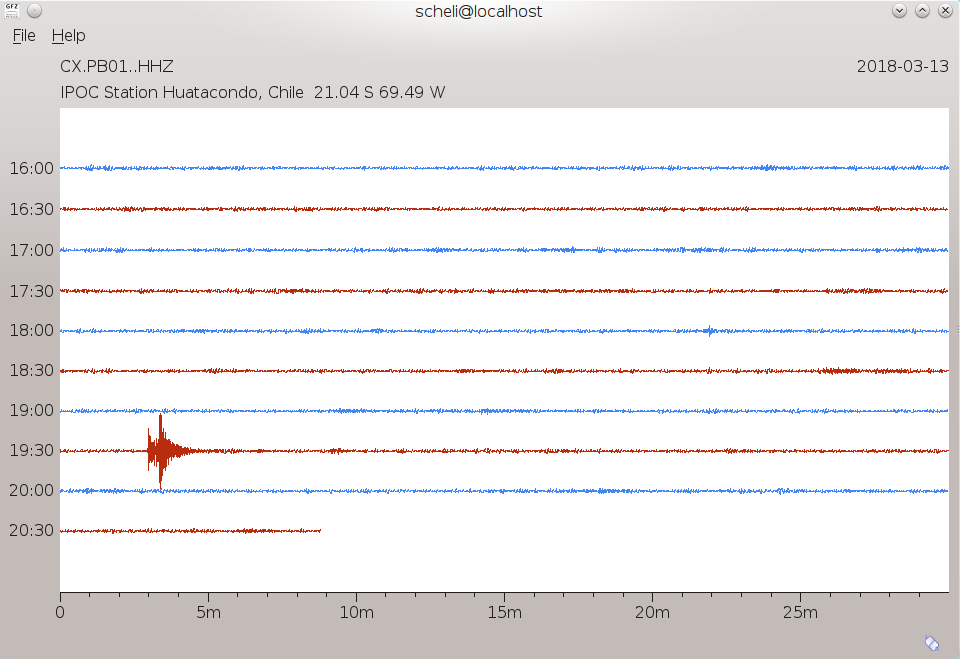scheli¶
Real-time helicorder view for one stream
Description¶
scheli visualizes waveforms from a single station mimicking a drum-recorder plot (see scheli).
Features¶
- scheli plots configurable traces in helicorder style
- Configurable GUI: trace colors, visualized time spans, number of rows, data filtering, amplitude ranges and much more.
- Automatic image capture: capture helicorder images at configurable time intervals and a set of channels
Examples¶
Simple helicorder window:
Let scheli show data from the CX station PB01 for the previous 5 hours.
scheli --stream=CX.PB01..HHZ --rows 10
Image capture:
Capture the helicorder plot for 3 stations in intervals of 10 seconds. The data is retrieved using seedlink and the plots are stored as PNG images. The image files are named according to network, station, stream and location codes of the requested stations.
scheli capture --heli.streams="CX.PB01..HHZ,CX.PB02..HHZ,CX.PB04..HHZ" --interval=10 -o "/tmp/heli_%N_%S_%L_%C.png" -H localhost -I slink://localhost
Setup¶
Colors of traces etc. can be adjusted by setting the scheme parameters in the global configuration of scheli. For alternating colors between the traces set the parameters scheme.colors.records.foreground and scheme.colors.records.alternateForeground in scheli.cfg, e.g. as for the example in the figure scheli:
# The general color of records/traces.
scheme.colors.records.foreground = 4286F4
# A general trace color of the alternate trace (eg scheli).
scheme.colors.records.alternateForeground = B72D0E
Configuration¶
etc/defaults/global.cfgetc/defaults/scheli.cfgetc/global.cfgetc/scheli.cfg~/.seiscomp3/global.cfg~/.seiscomp3/scheli.cfgscheli inherits global options.
-
scripts.postprocessing¶ Type: path
Defines the path to a script that is called whenever an image has been captured and written to disc. The only parameter is the path to the generated image.
Command-line¶
Generic¶
-
-h,--help¶ show help message.
-
-V,--version¶ show version information
-
--config-filearg¶ Use alternative configuration file. When this option is used the loading of all stages is disabled. Only the given configuration file is parsed and used. To use another name for the configuration create a symbolic link of the application or copy it, eg scautopick -> scautopick2.
-
--pluginsarg¶ Load given plugins.
-
-D,--daemon¶ Run as daemon. This means the application will fork itself and doesn’t need to be started with &.
-
--auto-shutdownarg¶ Enable/disable self-shutdown because a master module shutdown. This only works when messaging is enabled and the master module sends a shutdown message (enabled with –start-stop-msg for the master module).
-
--shutdown-master-modulearg¶ Sets the name of the master-module used for auto-shutdown. This is the application name of the module actually started. If symlinks are used then it is the name of the symlinked application.
-
--shutdown-master-usernamearg¶ Sets the name of the master-username of the messaging used for auto-shutdown. If “shutdown-master-module” is given as well this parameter is ignored.
Verbosity¶
-
--verbosityarg¶ Verbosity level [0..4]. 0:quiet, 1:error, 2:warning, 3:info, 4:debug
-
-v,--v¶ Increase verbosity level (may be repeated, eg. -vv)
-
-q,--quiet¶ Quiet mode: no logging output
-
--componentarg¶ Limits the logging to a certain component. This option can be given more than once.
-
-s,--syslog¶ Use syslog logging back end. The output usually goes to /var/lib/messages.
-
-l,--lockfilearg¶ Path to lock file.
-
--consolearg¶ Send log output to stdout.
-
--debug¶ Debug mode: –verbosity=4 –console=1
-
--log-filearg¶ Use alternative log file.
Messaging¶
-
-u,--userarg¶ Overrides configuration parameter
connection.username.
-
-H,--hostarg¶ Overrides configuration parameter
connection.server.
-
-t,--timeoutarg¶ Overrides configuration parameter
connection.timeout.
-
-g,--primary-grouparg¶ Overrides configuration parameter
connection.primaryGroup.
-
-S,--subscribe-grouparg¶ A group to subscribe to. This option can be given more than once.
-
--encodingarg¶ Overrides configuration parameter
connection.encoding.
-
--start-stop-msgarg¶ Sets sending of a start- and a stop message.
Database¶
-
--db-driver-list¶ List all supported database drivers.
-
-d,--databasearg¶ The database connection string, format: service://user:pwd@host/database. “service” is the name of the database driver which can be queried with “–db-driver-list”.
-
--config-modulearg¶ The configmodule to use.
-
--inventory-dbarg¶ Load the inventory from the given database or file, format: [service://]location
Records¶
-
--record-driver-list¶ List all supported record stream drivers
-
-I,--record-urlarg¶ The recordstream source URL, format: [service://]location[#type]. “service” is the name of the recordstream driver which can be queried with “–record-driver-list”. If “service” is not given “file://” is used.
-
--record-filearg¶ Specify a file as record source.
-
--record-typearg¶ Specify a type for the records being read.
Mode¶
-
--offline¶ Do not connect to a messaging server and do not use the database.
-
--end-timearg¶ Set the acquisition end time, e.g. ‘2017-09-08 13:30:00’, default: ‘gmt’
Data¶
-
--streamarg¶ The record stream that should be displayed: stream=net.sta.loc.cha
-
--filterarg¶ The filter to apply
-
--gainarg¶ Gain applied to the data before plotting. Units: counts/unit
-
--amp-range-minarg¶ Lower bound of amplitude range per row
-
--amp-range-maxarg¶ Upper bound of amplitude range per row
-
--amp-rangearg¶ Arround zero bound of amplitude range per row
-
--record-timearg¶ Does the last row always contain the last record received
Output¶
-
--descarg¶ Enables/disables the display of a station description
-
--rowsarg¶ Configures the number of rows to display
-
--time-spanarg¶ Configures the time-span (in secs) per row. Unit: seconds.
-
--aaarg¶ Sets antialiasing for rendering the traces
-
--xresarg¶ Output x resolution when generating images. Unit: dpi.
-
--yresarg¶ Output y resolution when generating images. Unit: dpi.
-
--dpiarg¶ Output dpi when generating postscript. Unit: dpi.
-
-oarg¶ Output filename (placeholders: %N,%S,%L,%C)
-
--intervalarg¶ Snapshot interval (less than 0 disables timed snapshots). Unit: seconds.

